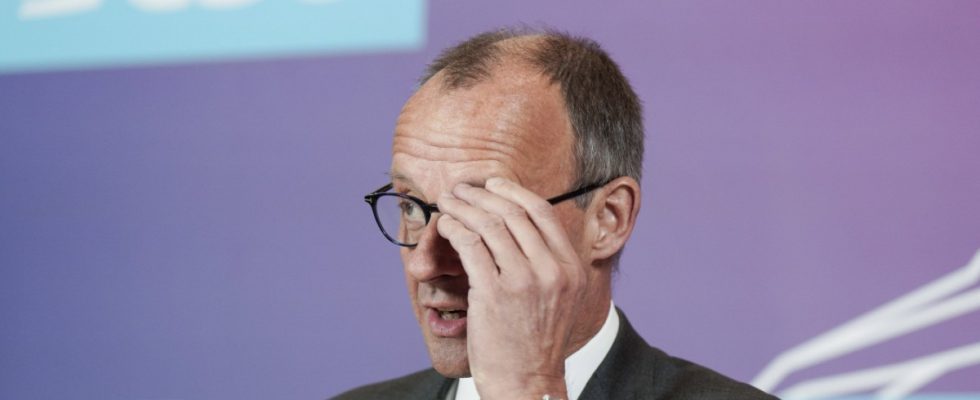These are numbers that should make Friedrich Merz happy – at least at first glance. In the new survey by the opinion research institute Forsa, the Union comes to 32 percent. It is therefore just as strong as the three traffic light parties combined. The Chancellor’s SPD party is only at 14 percent. When did something like this ever happen? If the survey were to become the election result, the Chancellery would go back to the Union. The CDU’s success in the state elections in Hesse also seems to give the Union a boost in the federal government.
But Forsa not only surveyed party preferences, but also personal values. And looking at it won’t bring Merz much joy. Despite the Union’s increased survey numbers, Merz’s numbers remain poor. When it comes to chancellor preference, i.e. the question of who one would elect as chancellor if he could be elected directly, Merz only gets 20 percent. He is only one percentage point ahead of Olaf Scholz, although his Social Democrats are a huge 18 percentage points behind the Union.
“A weak point of the Union”
The CDU leader also attributes the Union’s success to his work. After the two state elections a week and a half ago, Merz said that he had received “very, very, very much support” in Hesse and Bavaria for his “exaggeration”, which he “occasionally makes”. He thinks that this also “brought the election result up”. But the new Forsa figures show that Merz also lacks support from his own camp. When it comes to the question of Chancellor preference, only 47 percent of Union supporters are in favor of Merz. Scholz, on the other hand, has 66 percent of SPD supporters, although he is not necessarily a political heartwarmer.
And so Forsa boss Manfred Güllner draws a mixed assessment of his latest CDU figures. Whether the high mood for the Union triggered by the state elections remains “to be seen, especially since the low levels of sympathy for Friedrich Merz continue and remain a weak point for the Union,” writes Güllner.
Merz, on the other hand, points to the CDU’s successes this year – and in contrast to the traffic light parties, the Christian Democrats can throw a lot into the balance: a good ten percentage points plus in the repeat election in Berlin, where they are now polling more than for the first time in The governing mayor again for 20 years. Almost eight percentage points plus in the election in Hesse. And in the nationwide surveys we are consistently ahead of the competition with a huge lead.
The CDU state leaders Wüst, Günther and Rhein are counter models to the gruff Merz
But in the 2021 federal election campaign, the CDU had to experience how quickly poll numbers can collapse if its own candidate doesn’t win. Merz has been party leader since January 2022. If he had hoped that his popularity would grow as he continued in office, he had hoped in vain, at least so far. Hendrik Wüst, Daniel Günther and now Boris Rhein, on the other hand, have been able to score points with convincing election victories in their federal states – also as a counter-model to the sometimes gruff Merz.
The CDU leader likes to say that as an opposition leader you have to act differently than a prime minister. As an opposition leader, you also have to step up your game and wherever possible focus on a clear CDU course – in contrast to the prime ministers who are tied to coalitions, who tend to act in a presidential manner.
However, Merz’s opponents point out that even after a successful election, you need coalition partners who want to govern with you. And that it’s not just about the course, but also about the tone. You were therefore pleased with Boris Rhein’s analysis the day after the Hesse election. Rhein had said that they didn’t allow themselves to be tempted to fish on any edges. During the election campaign they “always appeared in style”. And they “always did it with a sound that never went over the top.” That was one reason for the success.

